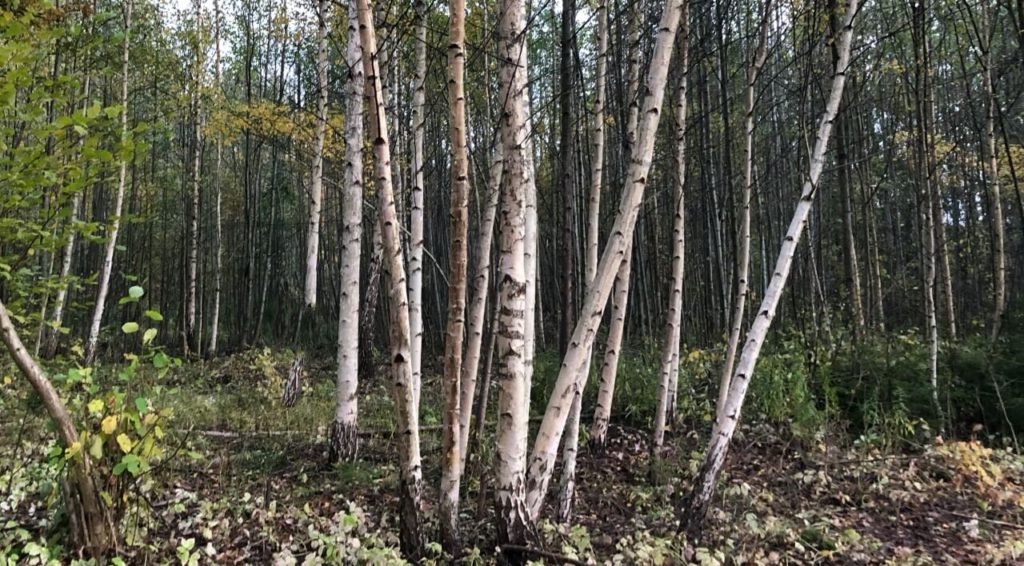Birch wood can be used in log house construction, but it may not be considered the most ideal material compared to other types of wood typically used for this purpose.

Here are some factors we want you to consider if you want to use birch:
- Durability: While birch wood is durable, it is not as naturally rot-resistant or insect-resistant as some other wood species commonly used in log house construction, such as cedar or cypress. Log houses are exposed to the elements, and using more rot-resistant woods can help ensure the long-term durability of the structure.
- Shrinkage and Settling: Log houses are built using whole logs that are stacked horizontally and interlocked at the corners. Birch logs have a higher moisture content compared to some other wood species, which means they may undergo more shrinkage and settling as they dry. This can result in larger gaps between the logs, which may require additional maintenance or sealing measures to ensure energy efficiency and structural stability.
- Availability and Cost: Birch wood may not be as widely available or as cost-effective as some other wood species used in log house construction. Local availability and market prices can vary significantly depending on your location. It’s worth considering other wood species that are commonly used for log houses and are more readily accessible in your region.
If you are specifically interested in building a log house, it is generally recommended to use wood species that are known for their durability, natural resistance to decay and insects, and minimal shrinkage.
Best trees for log buildings: cedar, cypress, pine, and spruce are some commonly used woods for log house construction due to their favorable properties.
Consulting with a local architect or us as a builder experienced in log house construction can provide you with more specific guidance based on the availability of wood species in your area and the specific requirements of your project.
Is birch tree good for construction?
Yes, birch trees can be used for construction purposes. Birch wood is known for its strength, durability, and attractive appearance, making it a suitable choice for various construction applications.
Our reasons why birch wood is considered good for construction:
- Strength and Durability: Birchwood is relatively strong and has good structural integrity, making it suitable for load-bearing applications. It can withstand moderate to heavy loads and resist warping or bending.
- Hardness: Birch wood is harder than some other commonly used woods, which makes it more resistant to wear and damage. This characteristic makes it suitable for flooring, cabinetry, and furniture where durability is important.
- Attractive Appearance: Birch wood has a pale, light-colored appearance with a smooth texture and often features a distinctive grain pattern. It can add a touch of elegance to interior applications such as paneling, trim work, and furniture.
- Easy to Work With: Birchwood is generally easy to work with using standard woodworking tools and techniques. It can be cut, shaped, and sanded easily, making it convenient for construction projects.
- Availability: Birch trees are found in various regions around the world, including North America, Europe, and parts of Asia. As a result, birch wood is often readily available in the form of lumber and can be sourced locally in many areas.
Is birch tree good for health and considered eco-friendly?
Birch trees have some health benefits and are generally considered to be eco-friendly. Here’s some information on their health benefits and environmental aspects:
Health Benefits:
- Traditional Medicine: Various parts of the birch tree, such as the bark, leaves, and sap, have been used in traditional medicine for their potential health benefits. Birch bark has been historically used for its anti-inflammatory, analgesic, and antiseptic properties. Birch sap is known for its detoxifying and diuretic effects, and it has been used as a traditional beverage.
- Herbal Remedies: Birch leaves are sometimes brewed into herbal teas and used as a natural remedy for certain ailments. The tea is believed to have diuretic, detoxifying, and anti-inflammatory properties.
Please note that while birch trees have been used in traditional medicine, it’s always advisable to consult with healthcare professionals before using any natural remedies or herbal preparations.
Environmental Considerations:
- Sustainability: Birch trees are considered to be relatively fast-growing, which means they can be harvested sustainably. When managed responsibly, birch forests can provide a renewable source of timber and other birch-derived products.
- Carbon Sequestration: Like other trees, birch trees absorb carbon dioxide from the atmosphere and store it as carbon within their biomass. This makes them valuable in combating climate change as they contribute to carbon sequestration and help reduce greenhouse gas concentrations.
- Biodiversity and Ecosystem Support: Birch trees provide habitat and food sources for various wildlife species. They contribute to biodiversity by supporting a range of organisms, including birds, insects, and fungi.
- Land Stabilization: Birch trees help stabilize soil and prevent erosion, particularly in areas prone to landslides or soil degradation. Their extensive root systems help hold the soil together and reduce the risk of soil erosion.

What can birch tree be used for?
Birch trees have a variety of uses and can be utilized in different industries. Here are some common applications for birch trees:
- Timber: Birch wood is used in the production of lumber for various construction purposes. It can be used for framing, flooring, cabinetry, furniture, paneling, and trim work. Birch wood’s strength, durability, and attractive appearance make it suitable for these applications.
- Plywood and Veneer: Birchwood is commonly used in the manufacture of plywood and veneer. Its fine grain and light color make it desirable for decorative finishes, furniture making, and interior design.
- Firewood: Birch wood burns well and provides good heat output. It is often used as firewood for heating and cooking purposes.
- Pulp and Paper: Birch trees are a source of high-quality pulp for the paper industry. The wood fibers from birch trees are used in the production of various paper products, including writing paper, cardboard, and specialty papers.
- Craftsmanship: Birch bark, known for its unique texture and appearance, has been used for centuries in traditional craftsmanship. It can be utilized in the creation of baskets, containers, decorative items, and even in the construction of canoes.
- Medicinal and Herbal Purposes: Various parts of the birch tree, including the bark, leaves, and sap, have been used in traditional medicine for their potential health benefits. Birch sap is sometimes harvested and consumed as a refreshing beverage or used in the production of birch syrup.
- Landscaping and Ornamental Planting: Birch trees are valued for their aesthetic appeal and are commonly planted in parks, gardens, and landscapes. Their attractive white bark, graceful form, and vibrant foliage make them a popular choice for ornamental purposes.
- Food and Beverages: Birch sap can be tapped and used as a refreshing drink, similar to maple syrup production. Additionally, the young leaves of some birch species can be used in salads or brewed into herbal teas.
That’s about all we can tell you about our experience and look at this versatile birch material. Thank you for visiting, and get in touch with us!